Probiotics given in biofilm state protect intestines, brain in NEC model: Study
Share :

Researchers have developed a novel probiotic system that harnesses the durability of biofilms to improve the administration of probiotics to patients, protecting against necrotizing enterocolitis (NEC) in piglet model, a new study said on Monday.
San Francisco: Researchers have developed a novel probiotic system that harnesses the durability of biofilms to improve the administration of probiotics to patients, protecting against necrotizing enterocolitis (NEC) in piglet model, a new study said on Monday.
The study, published in the journal Nature Scientific Reports, describes the use of a biofilm formulation of Limosilactobacillus reuteri (Lr) to prevent NEC in a piglet model.
Necrotizing enterocolitis is a debilitating and deadly condition that affects infants who were born preterm. In NEC cases, intestinal tissues become inflamed, and in severe cases there is ischemia and death of the involved intestines. Treatment for NEC often involves surgery to remove the dying tissue, the researchers explained.
“Even after decades of research, little has changed in terms of prognosis for infants who develop NEC,” said Gail Besner, MD, pediatric surgeon and principal investigator at Nationwide Children’s Hospital, US.
“Anywhere from 30 to 50 per cent of infants with NEC will die from it. And even those who survive face lifelong challenges, including short-gut syndrome and neurodevelopmental delays,” she added.
While previous studies have shown that the biofilm probiotic works in mouse and rat models, Besner and her team wanted to show that this approach to preventing NEC would work in an animal model that was more similar to humans.
In the study, the findings demonstrated the superiority of Lr in its biofilm state compared to planktonic (free-living) Lr in preventing the morbidity and mortality associated with NEC.
Importantly, Lr in its biofilm state not only protects the intestines from NEC but protects the brain as well, a finding of great potential importance for survivors of NEC, the researchers said.
"The data from this study help us understand the safety and efficacy profile of this novel formulation. This will be helpful as we work with the FDA to plan for future human studies,” said Joe Trebley, PhD, founder and chief executive officer of Scioto Biosciences.






